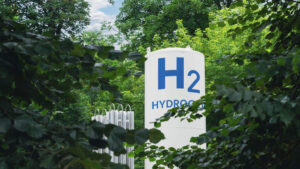ASX Green Energy stocks: Vulcan flags geothermal plant acquisition, Hazer slips on production delay

Pic: Getty
Vulcan Energy Resources (ASX:VUL) has acquired an operational geothermal renewable energy power plant in the Upper Rhine Valley at Insheim, Germany through the acquisition of the shares in the entity that owns and operates the plant.
A new Germany subsidiary of Vulcan, based in Karlsruhe, will be the owner and operator of the €31.5 million operation which was purchased by a portion of the proceeds from VUL’s recent A$200mn capital raise.
The company says the acquisition establishes it as an operational renewable energy business and plans are in place to formally take over the plant from January 1, 2022.
Vulcan will retain all existing local employees as part of the transition and hopes to invest in the expansion and modernisation of the power plant.

“Positively contributing to the energy transition”
Managing director Dr Francis Wedin said this move marks a significant first step in establishing Vulcan as a revenue generating, renewable energy producer.
“German State and Federal policy increasingly supports decarbonising heating and power grids, with a focus on decentralised, renewable energy and Vulcan intends to build a number of distributed geothermal renewable energy plants across the Upper Rhine Valley region,” Wedin said.
He said the company’s subsidiaries GeoThermal Engineering GmbH and gec-co (Global Engineering and Consulting-Company GmbH) have been active in Insheim for many years.
“We will capitalise on our local knowledge and expertise to continue to make a positive contribution to the energy transition in the region, while discussions with multiple local stakeholders to provide renewable heating to communities and renewable power to the German grid are ongoing,” Wedin added.
Lanadu geothermal plant brine offtake agreement
In addition to the acquisition of the Insheim plant, Vulcan has executed a 20-year binding offtake with GmbH – the operational Lanadu geothermal renewable energy plant in the upper Rhine Valley owned by the IKAV group – a Luxemburg renewable energy fund maanger and operator.
The agreement means Vulcan has the right to purchase and extract the lithium from the brine produced from Landau and return it to the plant for re-injection.
An off-take start date is set for December 30, 2024.
The existing production well at Landau has the tested ability to produce at a rate of over 100 l/s, but an additional re-injection well is planned to help accommodate this flow.
Once VUL has received the relevant permissions from the authorities, the Lanadu plant will provide access to accommodate the company’s demonstration lithium extraction plant ahead of a target start-up date of Q2, 2022.
Hazer announces delays to Commercial Demonstration Plant
Hazer Group (ASX:HZR) has announced a delay to the fabrication of a reactor for the Hazer Commercial Demonstration Plant (CDP), which pushes the date of the planned commissioning further out past Q1, 2022.
“Hazer has been advised that a manufacturing flaw has been identified in the Hazer reactor vessel currently waiting for heat treatment in China,” the company said.
“Quality assurance and non-destructive testing activities carried out over the last 48 hours have yesterday confirmed the presence of the manufacturing flaw and identified further areas of concern.”
“As a result of the flaw identified, the reactor shell has been deemed unsuitable and will require remedial manufacturing actions before it can be certified and accepted for dispatch.”
CEO Geoff Ward said the occurrence of this issue so far into the construction schedule is deeply disappointing, however, the company plans to work through the causes.
“The identified manufacturing flaw does not impact the planned operation of the reactor or our intended program of operations at the CDP,” he said.
“All other project activities are progressing as scheduled.”
Ward said Hazer will undertake cold commissioning and testing of the plant, including catalyst handling, fluidisation and control systems, prior to the delivery and installation of the reactor.
UNLOCK INSIGHTS
Discover the untold stories of emerging ASX stocks.
Daily news and expert analysis, it's free to subscribe.
By proceeding, you confirm you understand that we handle personal information in accordance with our Privacy Policy.








